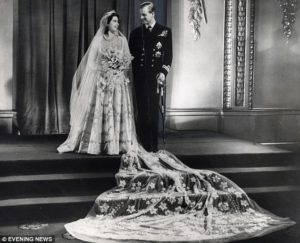Philip, Prince of Greece and Great Britain — a sonnet sequence within the larger sonnet sequence, The Encyclopedia Sonnetica
Simian Wound to Greece
“The new Greek king, Alexander, … was out walking his wolfhound, Fritz … and the dog was attacked by a tame Spanish monkey. While trying to release the monkey from Fritz’s teeth, the king was attacked by its mate and severely bitten in the leg…. Three weeks after that the king died from blood poisoning…. Winston Churchill later remarked that perhaps it was no exaggeration to say that ‘a quarter of a million people died of this monkey’s bite’—an allusion to Greece’s subsequent military campaign in Turkey, which was led by Alexander’s father, Constantine who returned to the throne”. ~ Philip Eade, Young Prince Philip
He loves his hound and takes a monkey’s bite.
A quarter of a million people die.
The king succumbs in death to this one slight
Infection and his family must supply
Another man. The substitution made
Leads on to war and battles made of blood
And assininity of greed. Decayed,
The dynasty which always was a dud
Construction of a flimsy set of chance
And venial politics, the sort of thing
That Greece is famed for, was far from romance.
Yet then there came the curved, romantic sting.
A prince became a consort to a queen.
Affected royalty slouched on. Obscene.
The Little Prince Who Grew
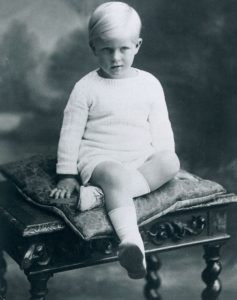
Like me he grew up slim and sturdy, blond
As Greece or Florida in sun. He crawled
And stood up. Women around us were fond
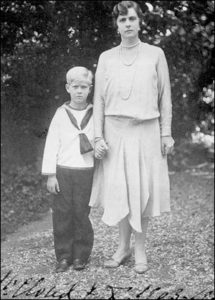
Of gold smiles, Philip and Phillip. They mauled
Us with their cuddling kisses. We were fine,
Right through it all, both of us a prince, though
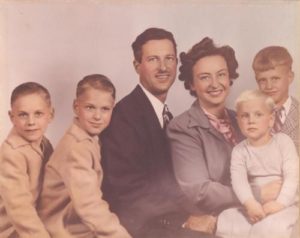
The one was of the royal kind. The shine
From these two boys was like the gilded glow
Of white and gilded French provincial chests

In afternoons of spring, each interspersed
With laughter all day long, with little jests,
Nicknames and morningness ready to burst.
We each were waiting for our special hour.
We each required a planet and one flower.
Arcachon, Summer, 1923,
White-Blond Hair
“quite too adorable for words, a perfect pet, so grown up & speaks quite a lot & uses grand phrases. He is the sturdiest little boy I have ever seen & I can’t say he is spoilt.’ ~ Louise, Queen of Sweden, on Philip at the age of two
“the little blue-eyed boy with the most fascinating blond-white hair” ~ Hélène Foufounis on Philip
There’s nothing wrong with being sturdy, or
Intelligent—or beautiful. The strong,
Hot sun, Apollo, spread out on the shore,
Has not forgotten in the centuries long
Since death destroyed gods, that then and now
He was the god of words as well. He spoke
In light and poetry. The laurel bough
Was his to give. New little boys evoke
Divinity along the Middle Sea
Especially when they can give bright tongue
To words and phrases. They make a decree
Received by aunts and mothers of the young.
The other children near them recognize
Them too, that blueness in their holy eyes.

Lighthearted in Italy:
Beginnings of British
Insouciance
At eighteen months the Attic prince was laid
Inside a fruit crate on the ship that took
His family into exile with a maid
Or two and valet. Nanny calmly shook
A blanket over him that winter day
And so he was oblivious to pains,
Unlike his sisters who in sweat’s dismay
Burned all their letters. Caught in panic’s strains
Two parents also fled to be on board
The little cruiser sent to banish their
Old life from them. That much was their reward
For being make do royals in despair.
But back on land young Philip on a train
Made light of loss, licking the window pane.
The Poet Passes through Surrey
while Reading Young Prince Philip
More like a colt than other creatures, born
A colt with slim limb beauty and with lock
Of blondness down his forehead to adorn
It, princely maleness made those near him gawk.
He was not a Greek god or a prince of
Greece except by accident. He was more
A boy of British public schools. The love
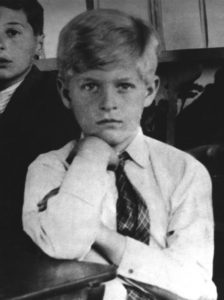
Prepared for him, the love ordained before
He knew it, was a royal one. Fine nose
And lips deserved the finest woman, wife,
And mother of his colts in turn. He chose
Her. She selected him to mate for life.
Germanic, Danish, Russian, lately Greek,
His soul resounded as a king’s physique.
What Comes from Having
a British Housekeeper
He, raised on Scottish porridge in the land
Of ancient Greeks, on tapioca, rice,
And other British blandness, grows a gland
Enlarged enough that it can thrust and slice
Its way to royal climax in a queen.
That phyllo colored semen slobs its way
To ova. Her baby-making machine
Pops out three princes and a single stray
Infanta princess. The rest is history.
The craziness of families and of chance
Results in dual dynasties blistery
With human faults and merits in a dance.
He went to Gordonstoun while in his teens,
Becoming strong to give her off-white genes.
Even as an Actor in Macbeth
He wore a white gold crown wherever he
Was living, Denmark, Greece, and also here
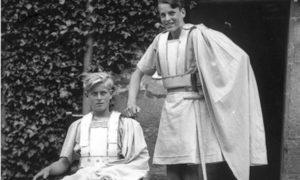
In Scotland and in England. Like a spree
Of happiness, he was a musketeer
Of royal beauty whose blond diadem
…..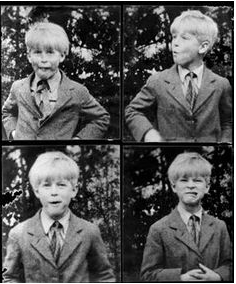
Was full of pranks and alpha male-ish fun.
His suffering something to deny, a gem
Worn silently concealed the way a nun
Belies distress, young Philip’s pain was hard
As diamonds inside a regal watch
That keeps to time inerrantly. If scarred,
He never showed it. Platinum the swatch
Of hair across his forehead, silver gold,
Was like a future victory foretold.
This poem has been set to music: https://www.youtube.com/watch?v=7EYKpTUlZcA
Queen Mary & the Governess:
Ho Hum Hussies
The queen of England met the young Greek prince.
She said he was quite nice and had blue eyes.
Her Majesty flunked the test to evince
The slightest insight. That is no surprise.
Queen Mary was just a bloody human
With all our ordinary blindnesses.
She had none of the prophet’s acumen.
I doubt that she had normal kindnesses,
Too. Crawfie said he was a Viking with
Blue piercing irises, “fair-headed,” and had
A “sharp face.” That just fits in with the myth
Of Nordic pirates. So much for the lad
Whose destiny was far beyond their sight,
Unequals equal, myopically trite.
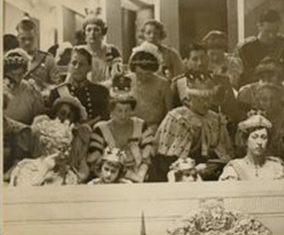
Battered Porphyry
‘The eldest girl, Ria, was in plaster up to her hips for four years as a result of a bad fall, and Hélène [Foufounis] later
described how Philip would sit for long periods next to her [Ria’s] bed talking to her, refusing to be lured away by the
children. One day a spectacularly insensitive guest bought some toys for all the children except Ria, explaining to her
that “you can’t play like the others”. The others were stunned by this, none more so than four-year-old Philip, whose eyes
“grew wider and bluer. He looked at Ria, who was trying very hard not to cry, then he ran out of the room and returned
ten minutes later with his arms full of his own battered toys, and his new one, and he put them all on Ria’s bed saying, “All
this is yours!” ’ ~ Philip Eade, Young Prince Philip, 48-49
A mix of boisterous boyness and frank
Good nature, that was Philip, Prince
Of Greece. But he was also full of prank-
like slyness needed to deflect the wince
Caused by crudeness. But wait. I just now said
“Of boisterous boyness,” so that’s of course.
Who knows what’s going on inside the head

Of lads? And who could understand this Norse
Prince sitting by the side of Ria, so
Devoted to bedridden girl needs
That no one else could tempt him from the glow
He wanted for her. Selflessness’s deeds
Were his. Alien to the realm of boys
Of lower sorts, he gave her all his toys.
Sneakiness and Bravery
The prankish prince observed, but not too well.
His friend and he had seen the Arabs ply
Their Persian carpets on the beach. To sell
Some, Philip and Ianni had to shy
Examples from the house and then both tried
To hawk them door to door. It was a game
That clueless boys might play. They didn’t hide
Their trick and didn’t show very much shame.
They broke a vase together. Ianni got
The usual hard spanking from the much
Feared governess. But Philip shunned her swat
Preferring Roosie’s much less hateful touch.
Macdonald threatened, “Step up. I’ll spank you.”
The Prince said, “No. Mine from Roosie, thank you.”
More than Just Blue Eyes
His family was as full of grief as most
Extended ones, blue of flowers more
Like purple though. While on the Baltic coast
With Alexandra sporting on the shore
Perhaps he temporarily forgot
Along with her King Alexander’s death.
They played in waters iced as sorrow fraught
With royal loss until his frisky breath
Was lavender with breathing that had passed
The patience of his playmates. They obeyed
Commands from adults. Philip though was fast
In his determination. He still played.
They dragged him gnashing from the waves as blue
Of skin as Britons daubed with wode and rue.
Prince of Pigs
………………..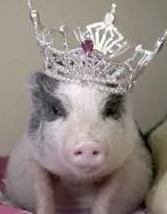
Who needs an enemy when kinfolk will
Suffice? Close kin are guaranteed the best
Assassins of your character. They spill
The pigsty beans. That’s one great litmus test
Of families. Princess Alexandra told
A story of the pigs at Panker, how
Young Philip let them out and then, behold,
The swine (the pigs, not him) went wild (kerpow!)
Among the tea things on the adults’ lawn.
In fact the situation was much worse
Than that. She said he herded them up on
The grass deliberately, a prankish curse.
The prince denies remembering this scene
But gossip is the best when it’s unclean.
The Foal Who Might Have Been an Untamed Stallion
A prince was just a swimming boy once
(Though destined for the polo course), but still
A little lad like others . . . and no dunce
About controlling nannies. He was shrill
In his refusal to be bossed around
There on that Baltic beach. His lips turned blue
Because he flatly wouldn’t give his ground
About the right to stay and play right through
The chilly afternoon, his shrimping net
Abandoned as he gamboled in cold pools
Along the coast. Each reprimand was met
With iceberg-like determination. Mules
Could not be more rebellious. Yet the scene
Changed. Philip ended paced behind the Queen.
He Would NEVER Have Been that Mean
What turns a selfish, show-off boy to just
Another henpecked husband? Upside down
This Philip always had a childish lust
For getting quick attention like a clown
By standing on his head when guests arrived.
At Villa Georges the FouFounises kept
Their swine, much like at Panker where pigs thrived.
He fed them happily. One day he crept
Around and freed and helped them make their way
To where the adults sat and had their tea.
These porcine guests caused havoc and melee.
Prince Philip was delighted with this spree.
..Of course when he was consort to the Queen,
….He said he had no memory of that scene.
Mother’s Unhinged Love, Father’s Unrepentant Loves
A blond much raised without his parents through
His early years may be quite different from
A brown-haired boy whose blood is far less blue.
Instead of royal meals he got a crumb
Or two from palace tables. Father had
His mistress interests. Mother had her soul
To deal with. Not that it was bad,
But it was vexed like a palimpsest scroll.
This prince was more a nomad in the sands
Of Sinai with beggarly mirage
For background in the desert’s arid strands.
His aunts and uncles were his entourage.
..The mother wore renunciating clothes
….And mental illness with its dried up oaths.
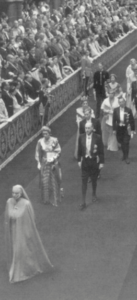
[The following sonnet may offend some readers. Do not read it if you think you may be offended.]
H.R.H. Prince Philip
His limbs have shrunk. The skin is slack
And wrinkled like his balls have always been
Though it is paler, thinner than that sack.
The hairs that used to stick out from each shin
Evaporated years ago and yet
She still remembers him hunching above
Her, ramming lust to cause the final jet
He needed, Needed, NEEDED. That was love
As love should be. She cherishes that now
And tries to put the dwindled husk aside
When looking at him. She would love that plough
Again if it would work like when a bride
She took his thrust in planting. Now he’s shrunk.
He cannot get it up, much less shoot spunk.
